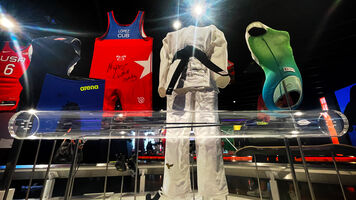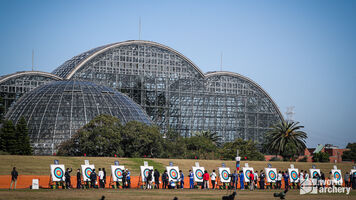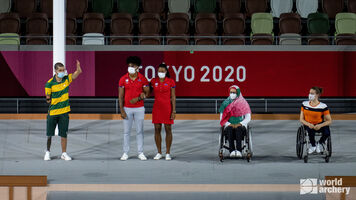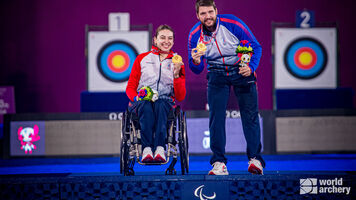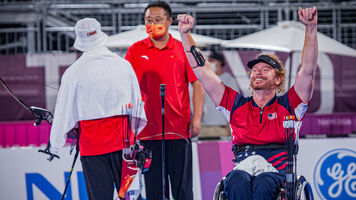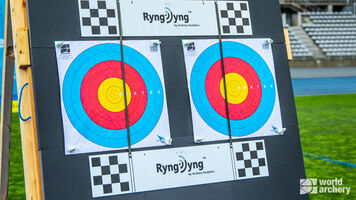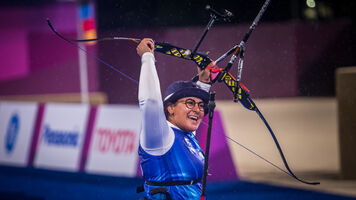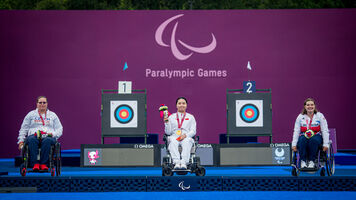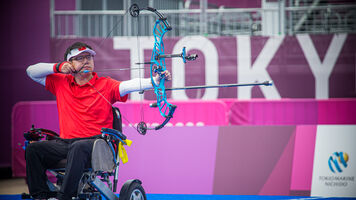The promise keeper: Mete Gazoz realises his Olympic dream
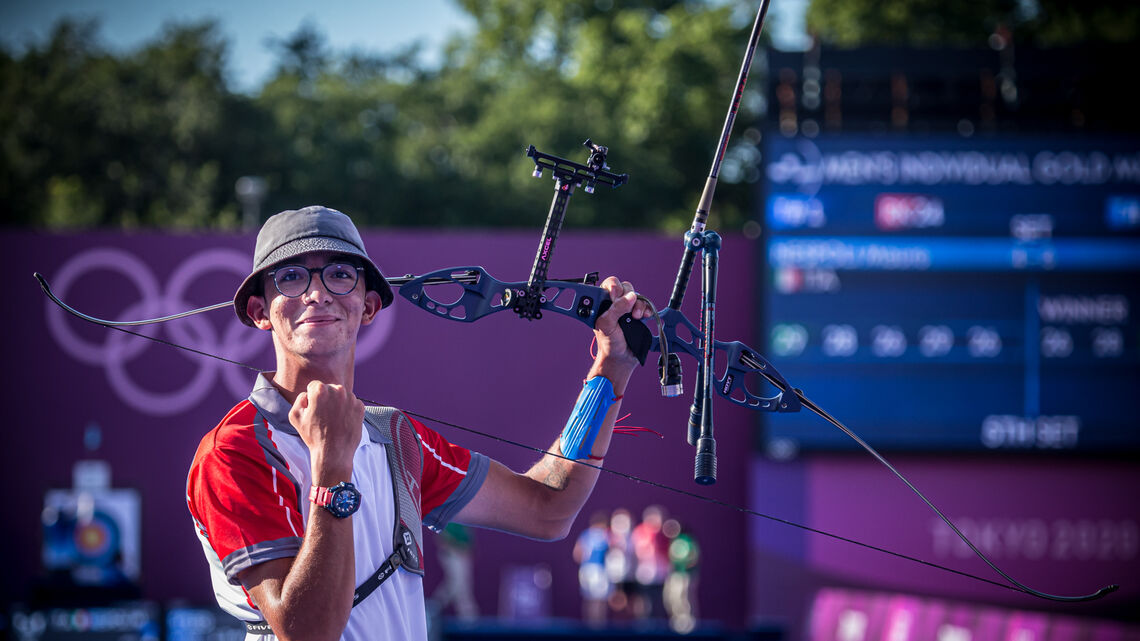
Mete Gazoz arrived at the Tokyo 2020 Olympic Games enamoured by gold, in that fitful sliver of subconscious where dreams and reality blur. It was the prize he expected, the reward he believed he deserved.
The Turkish archer knew he was not alone in this belief.
Every athlete enters the Games with aspirations of reaching the medal stand, and they do not yield willingly. More often than not, Olympians return home with nothing.
Gazoz’s medal arrived in due course, delivered with a thrilling victory over Italy’s Mauro Nespoli to give Turkey its first Olympic archery medal in the nation's history.
And yet even then, the prize seemed to manifest in the realm of fantasy, as stories of binding oaths and magical garments surfaced to make the achievement appear almost preordained.
“I believed in myself wholeheartedly,” Gazoz said after his victory, an acknowledgement of the sheer force of the vision he’d built for a half-decade as the next great hope of Turkish archery.
“I’m always aware of my potential, and my hard work brought me to the top of the stage. I was able to combine hard work and talent so that winning a gold medal became inevitable.”
The victory was also a testament to the bond he shared with his coach, Goktug Ergin, who began his march toward an Olympic medal decades earlier, first as an athlete, and then entrusting the pursuit with the prodigy who emerged from his burgeoning program.
“I still can’t believe we’ve done it,” said Ergin, who began shooting after watching the Atlanta 1996 Olympic Games on television and competed 12 years later in Beijing.
“It’s impossible to touch that gold medal, it’s impossible to hold it in your hands. This was our biggest dream.”
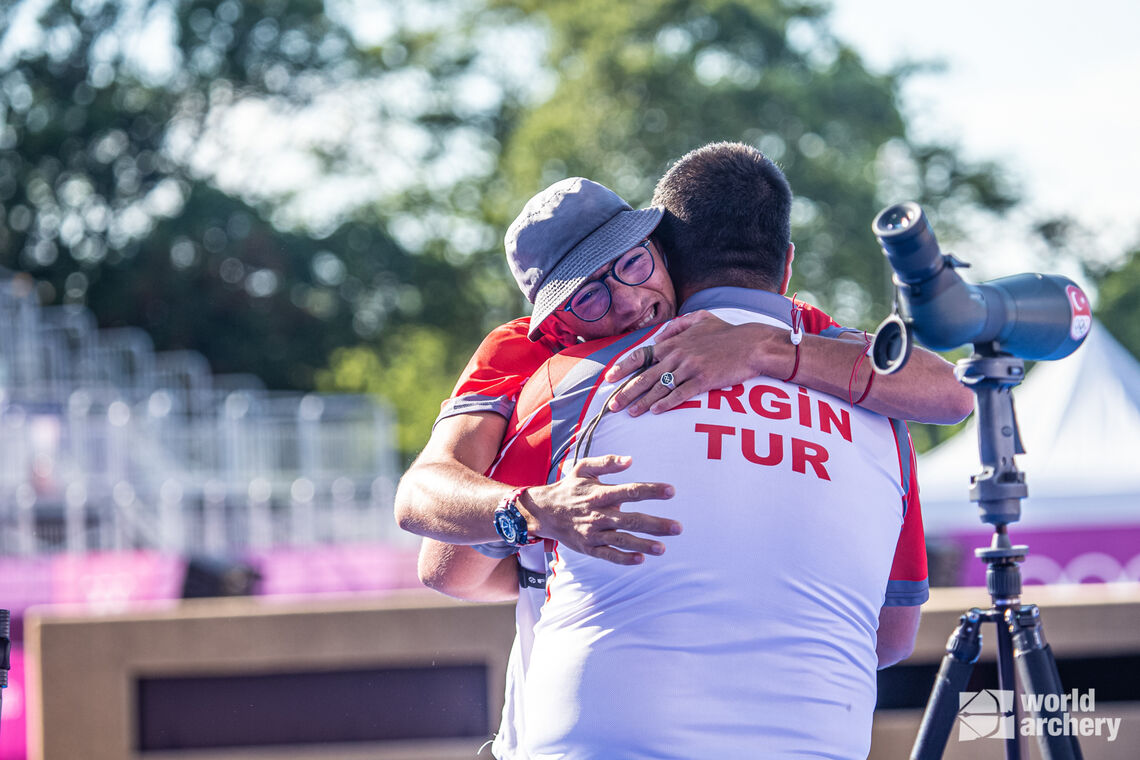
Ergin recalled returning to the Olympic village that night in a daze, still processing the magnitude of what had just occurred. “I couldn’t believe we’d just won,” he said. Sharing a room with a member of his staff, Cem Gizep, the incredulous coach issued a directive for the following morning.
“I told him, ‘if I wake up and it’s the same day, I’ll kill you’,” Ergen said. “Don’t tell me it’s the 31 of July. Tomorrow morning, you are going to tell me we are in the first of August, and that we have the medal.”
Violence would not be required. Ergin woke up reassured of the previous day’s proceedings. The calendar had flipped to August. Gazoz had indeed won Turkey’s first Olympic medal in archery.
Still, Ergin remained unconvinced. “I told my staff to send a message to Mete,” he said. “I wanted a picture of the medal. I wanted to be sure we had the medal before I got out of bed. Otherwise, I wasn’t going to get up. I would sleep all day.”
Ergin laughed.
The idea that an Olympic medal, for most mortals, requires commitment to the point of obsession, confidence to the point of delusion – this truth has been the central preoccupation of his life.
For his star pupil, though, attaining such a goal demanded less scrutiny. The son of former national archer Metin Gazoz, Mete first picked up a bow at the age of three and was soon enrolled in a series of extracurriculars to supplement his natural abilities.
There was swimming to strengthen his shoulders, piano to enhance his hand-eye coordination, painting to broaden his attention span, choir to gain confidence in front of crowds and chess to develop his critical thinking.
“Since childhood, he would always say to his father, ‘daddy, I know how you will go to the Olympics. I will go to the Olympics, I will win a gold medal and you will watch me there’,” Gazoz’s mother, Meral, said. “He’s had that dream since he was little.”
Mete began working with Goktug at an early age and made his Olympic debut at Rio 2016, losing in the second round of the individual competition to Sjef Van Den Berg of the Netherlands.
Speaking to the press after the match, he expressed frustration at his abrupt exit, vowing to eradicate the disappointment at his next appearance in the Games. Bespectacled, with a look of determination that belied his cherubic face, Gazoz stared into the camera and announced his intentions to crest the podium in four years time.
Ergin, standing behind his star pupil, was stunned by the audacity.
In a sport that often privileges the innocence of youth, he felt compelled to offer a gentle course correction.
“I was so angry with him. It didn’t seem realistic,” Ergin said. “I told Mete, ‘these are really big words, you don’t have to speak like that’. But he told me, ‘no, I believe it. I will make it to Tokyo’.”
Words weren’t enough. A commitment to excellence would have to follow.
“I will work harder and return a gold medal from Tokyo in 2020,” Gazoz declared on his Twitter account, a statement of intent to hold him accountable. He was 17 years old.
“If you want to be an Olympic Champion, we will work like an Olympic Champion,” Ergin recalls saying. “It became a contract between us, the Olympic difference. His words – this promise – became the biggest source of motivation during the years that followed.”
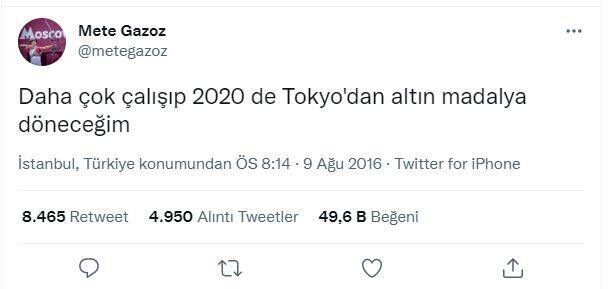
Five years and one interminable pandemic later, Gazoz’s desires were even more ravenous – except he somehow still hadn’t secured his quota. Only one other qualifying tournament remained when he finally secured his spot at the Antalya 2021 European Championships – fewer than two months before the Games.
Yet his belief in himself did not waver.
Even as his chances to qualify slipped away, Gazoz trusted that he would be mentally strong enough to deliver when it mattered most.
“Only the strongest will win,” Gazoz said. “No one is going to give me the quota. I have to take it.”
Gazoz won the qualifying event in dominant fashion, flashing a glimpse of the standard he knew he possessed but hadn’t always managed to reach.
He punctuated his relief with a roar, then a clenched fist that has become something of a trademark for the 22-year-old, signalling, “I grabbed the win and snatched it.” The brim of his bucket hat shielded the top of his face.
The garment previously belonged to Ergin, stuffed inside his bow case for years until Gazoz asked to look inside one day after practice in 2017.
Ergin hadn’t opened the bag since his competitive shooting days, when he retired after failing to qualify for the Games in London.
The hat was only collecting dust, which made parting ways with it easy when Gazoz asked if he could start wearing it. The item evolved into a symbol between the two, strengthening their bond even further.
“Mete is the type of guy who always wants to have some sort of connection with people who he loves,” Ergin said. “Without talking, we can understand each other. There’s an inner connection between us, and he believes wearing it brings him some power.”
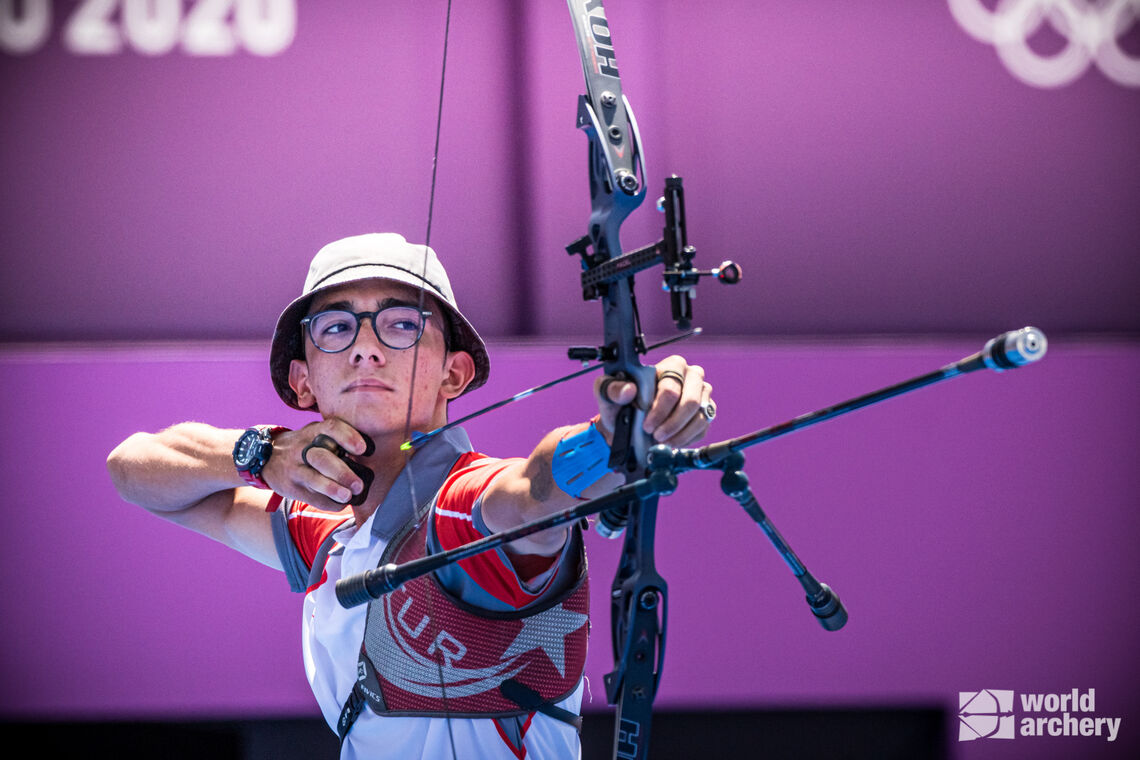
That power was on display in Tokyo, as Gazoz entered his second Olympics ready to fulfill the promise he made five years earlier. Rather than feeling smothered by the pressure, Gazoz maintained his focus and rose to the occasion to reach a standard many have strived for but few have reached.
The tournament was tense and tight, as all Olympics tend to be. Emerging from an exclusive bracket of the world’s best archers requires immaculate shooting, stamina over multiple days and, perhaps, a little luck.
Gazoz dominated world number one Brady Ellison in the quarterfinals, taking points in four of the five sets, including a perfect 30 in the fifth to cement a 7-3 victory.
He then dismissed 2012 Olympic silver medallist Takaharu Furukawa by the same score in the semifinals, posting another 30 to close the match out.
Turkey’s first podium in archery was secure. One more victory would make it gold.
But Gazoz started slowly in the final against Nespoli, falling into a 3-1 hole. Everything was unravelling.
“Although it didn’t start well, I didn’t hesitate in the rest of the match,” Gazoz said. “In 2016, I was demoralised by my shot. I lost my concentration immediately, and I failed. From 2016 to 2021, I improved myself both physically and mentally. I was more eager and decisive. I was sure that my determination would bring a gold medal to me.”
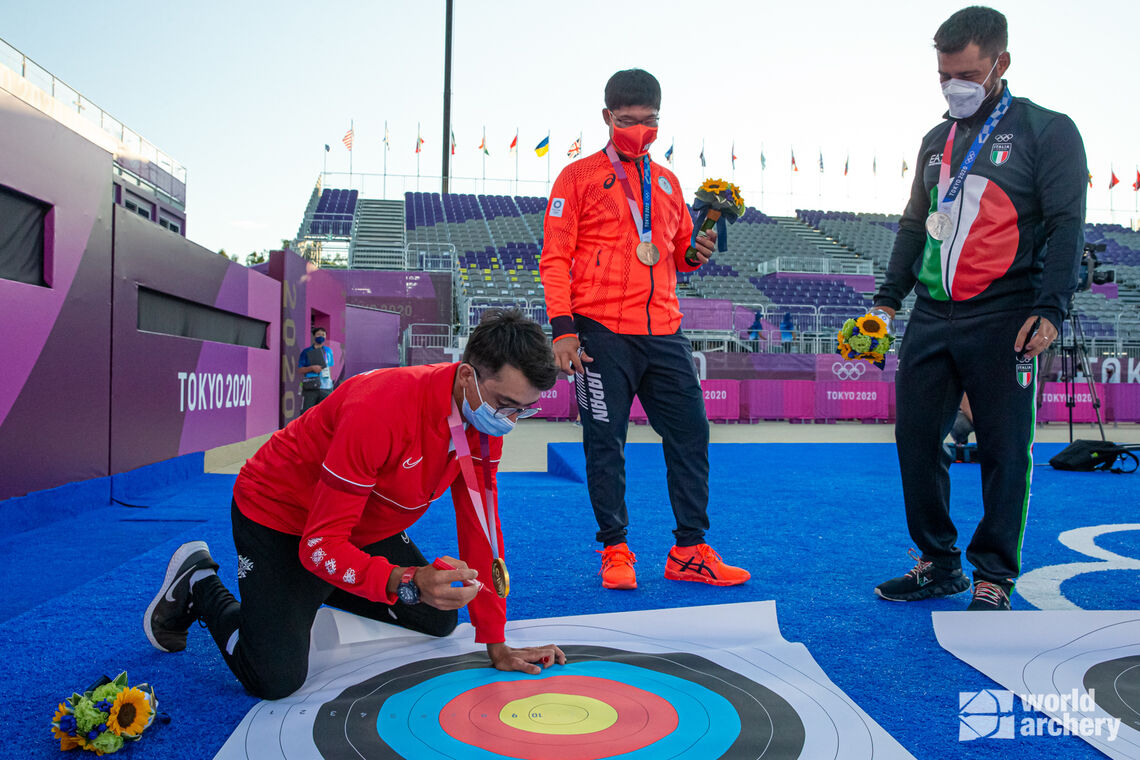
Gazoz capitalised on a wayward third set from Nespoli to tie the match. The two archers each shot 29s in the fourth, bringing both within three arrows of securing the victory. The Games came down to three arrows.
Mete pulled away.
One last arrow in the middle would win it for Gazoz. With his trademark twist from the hips, the young Turkish archer raised his long, slender arms to deliver one final arrow in Tokyo. It was a beautiful shot that went into the heart of the target.
“It’s an undefinable honour for me to bring a gold medal to my country,” Gazoz said. “I had mental pictures of every piece of my training, every sacrifice I made in that brambly road. It’s an incredible feeling. When I look at my history, it makes this gold medal more precious.”
After five long years of training, of toiling away in pursuit of an elusive goal, the work, the venue and the day conspired to deliver Gazoz and Ergin their ultimate dream.
“In 50 years, if someone asks me what I remember about Tokyo, probably I will cry and I will say it was my happiest day,” Ergin said, reflecting.
“Happy is not enough to describe my feelings,” he continued. “It was my day. If someone told me, 'you will only live one day in the world, which one do you pick?’ I will pick the 31 of July’.”
“It’s enough for me. It’s enough for my whole life.”



